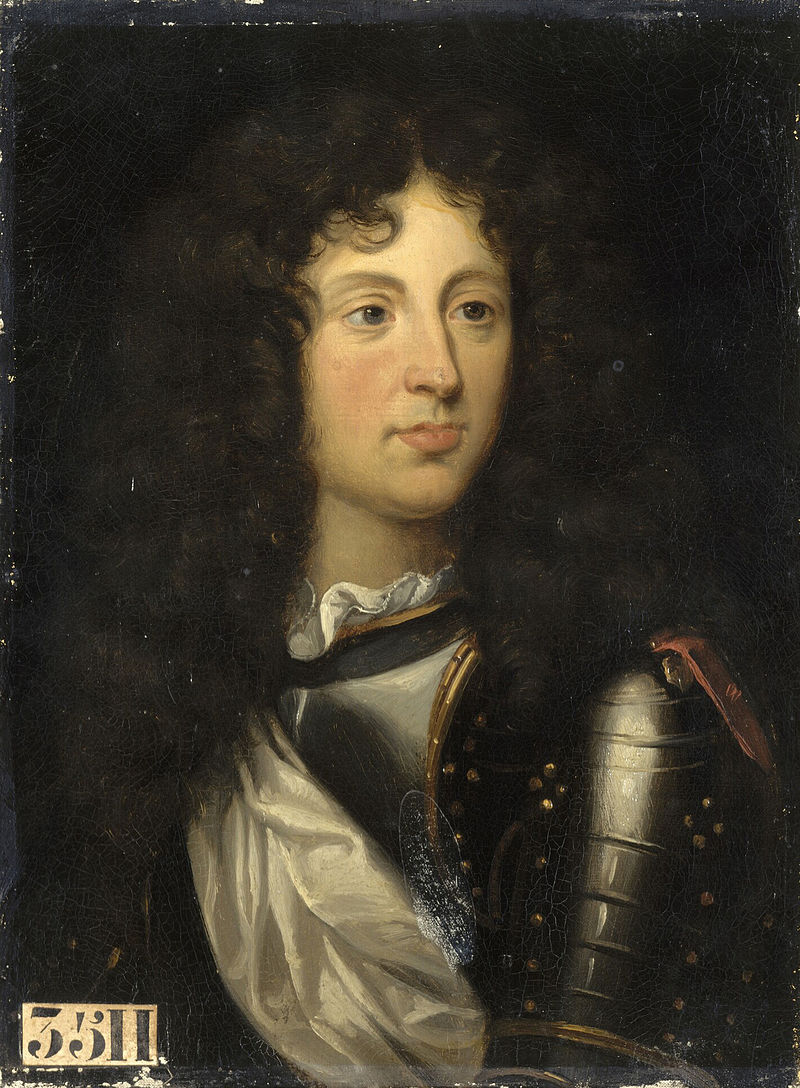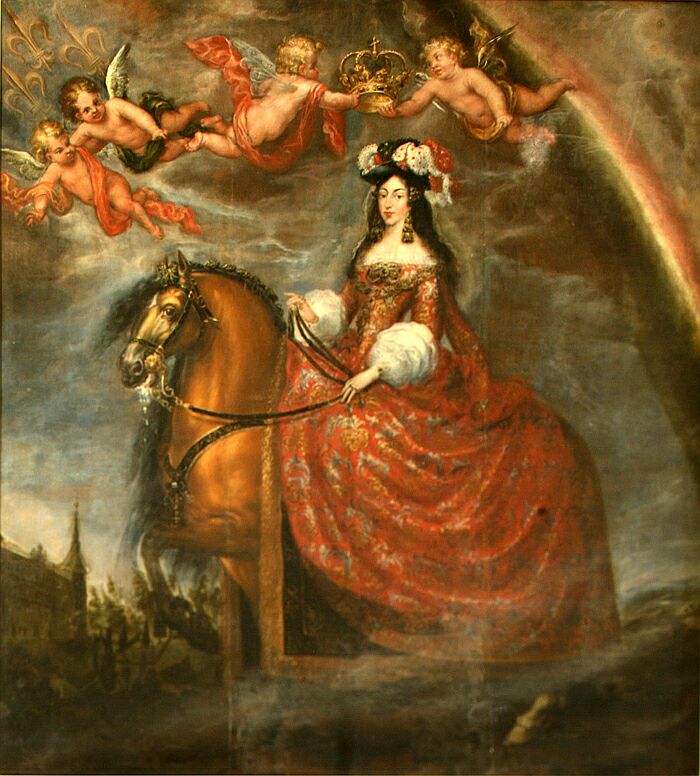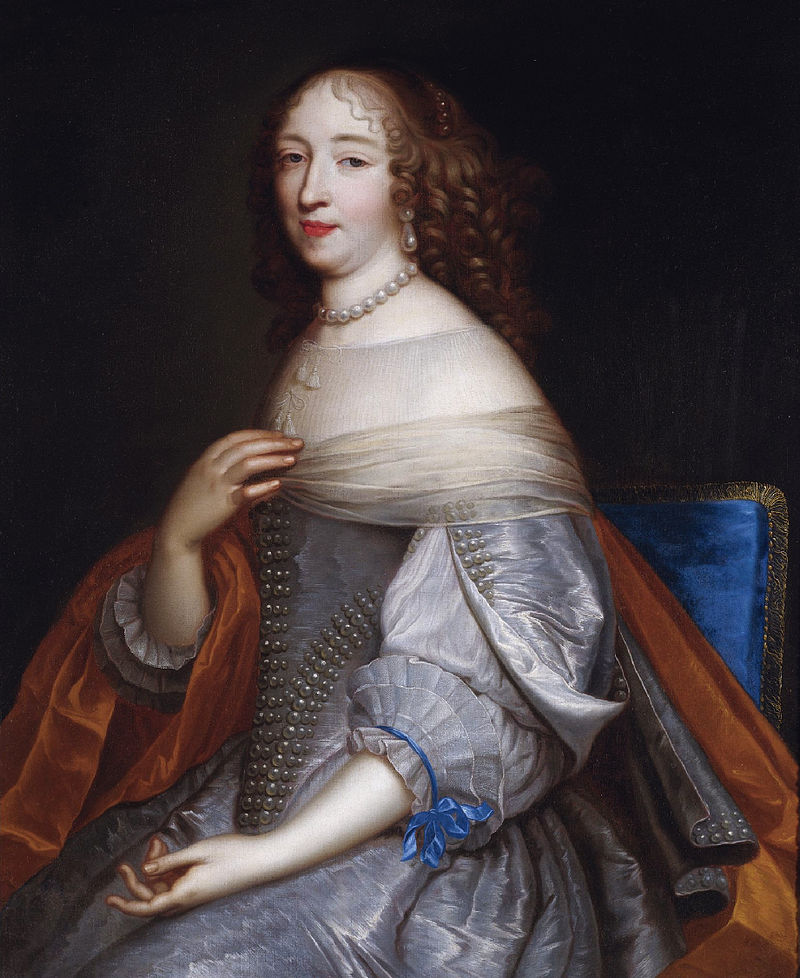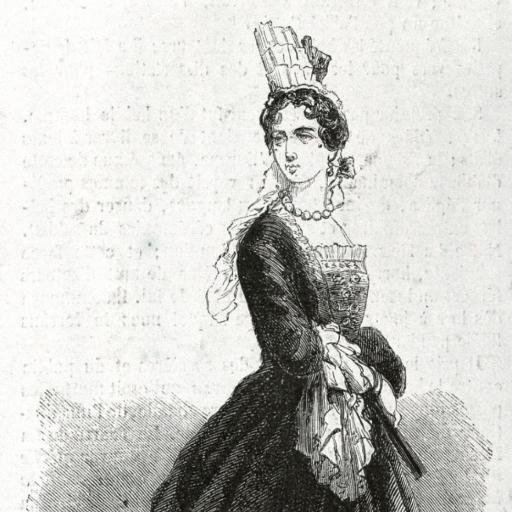Julie d’Aubigny, Mademoiselle Maupin
One can use a lot of words to describe Mademoiselle Maupin, a flamboyant cross-dressing opera-singing swords-woman, but utterly badass might be the most fitting.

Julie was born between 1670 and 1673 to Gaston d’Aubigny, who served as secretary to the Comte d’Armagnac. Said Comte d’Armagnac, Louis de Lorraine, was a Prince of Lorraine and the Grand Écuyer of France and on very friendly terms with Louis XIV. Thus Monsieur d’Aubigny, who wasn’t just a secretary, but also trained pages for the royal stables, had quite the good standing in a very respected and rich Household.
Monsieur d’Aubigny thought it fitting for his only daughter not just to receive the usual educations girls could enjoy, aka reading, writing, dancing, singing, needlework, riding and drawing, but went slightly unusual ways. He also had her learn about different types of weapons and how to use them along with the boys he taught. Julie was a quick learner and became very skilled with handling a rapier and since that is slightly easier in breeches, she took to dressing as a boy. Something else she learned from her father, was a fondness to drink quite a bit and excessive gambling. Monsieur d’Aubigny apparently spend his days in service of the Comte and his nights in company of different women, wine and cards.
Growing up among men and boys, fierce Julie noticed quite early that she could not just command her own rapier… but also theirs with a coy glance or a flutter of dark lashes. And so, as she was between fourteen and fifteen years old, she became the mistress of her father’s master. The Comte was around thirty years older than her, married and at that time the proud father of fourteen children. He was still very handsome and a man with great manners and elegance. Julie took his heart by storm.
The Comte d’Armagnac introduced Julie to the court and the world, spoiled her with presents and took her to entertainments… but even for a man of his rank and status, having such a young mistress, an unmarried one on top of it, was not too good for the reputation.
Louis de Lorraine went in search for a hubby for his young and lively mistress and found a certain Monsieur Maupin, from Saint-Germain-en-Laye, who was willed to marry the girl. Everything was arranged in a swift. Julie married Monsieur Maupin. The affair continued… but Julie soon proved to be more than the Comte could handle.
He was a man of advanced age, who had in fought wars and his oldest son and heir was ten years older than Julie. She was too adventurous, too lively, too curious, too uninhibited. He became overwhelmed by it all and decided to end the affair.
Louis de Lorraine apparently arranged for a promotion for Monsieur Maupin as an overseer of tax collection in the provinces. Depending on the source, this either happened shortly after the marriage, in order to have the husband away on business to make merry with the wife. Or as he decided Julie was too much to handle for him. In case of the latter, he apparently hoped that Julie would accompany her husband to the provinces, but that plan failed. Julie refused to do so, saying she had no desire to follow her husband to the country, for the position was not paid well enough to support them both. Julie stayed in Paris… and went wild.

As a married woman Julie was enjoying certain freedoms an unmarried Mademoiselle could never have in polite society. She was her own master, with her husband being away, had own lodgings, money to spent on whatever she pleased, could go wherever she wanted… even if the places where deemed unfit for the female gender. Julie frequented the so-called salles d’arms, larger and smaller rooms used for fencing, drank, gambled, picked fights with young members of the nobility and slapped shopkeepers.
During one of her outings, she met a young man called Sérannes. This Sérannes was a fencing instructor and Julie conquered his heart in a swift. As it happened, Sérannes was a wanted-man. The Parisian police, and its chief La Reynie, where after Sérannes for engaging in a duel, forbidden by law, which resulted in the demise of a man. Duelling was not a petty crime. Louis XIV hated duels, for he saw no reason why young and capable men, especially when they were members of the nobility, should kill each other due to some silly dispute which he could sort out as well. As the police was closing in on Sérannes, he had to flee Paris and Julie went with him.
They went en route to Marseilles and since Sérannes did not have as much money as he claimed to have, the couple started to entertain the locals along the roads with singing in taverns and fencing performances. Julie mostly dressed as a man during this time, but did not hide her female features. That did attract quite the audience… and if it should happen that someone did not believe that Julie was actually a women, she simply lifted her chemise to prove them otherwise. Once they had arrived in Marseilles, they toured the local taverns in order to earn a living in first. Julie, being as good with a rapier as with singing, then went to the music academy of Pierre Gaultier, a friend of the great Monsieur Lully, and was allowed to join the academy.
Julie used her maiden name during her performances under the guidance of Monsieur Gaultier and was able to provide for herself and Sérannes sufficiently. Life was good. Julie enjoyed Sérannes, as well as the admiration of other young men… and also women. She started to find the latter, the idea of being with a woman and to be seen in public, while dressed as a man, with a women, rather interesting. Women ogling her with dreamy eyes, because they mistook her for a young Cavalier, wasn’t news to her. It happened regularly… and she started to like it and to play along… while she slowly but surely grew tired of Sérannes… and then, as she said, of men in general.
Julie was ready for a new adventure. And there was one girl, a beautiful blonde youth, who had taken her fancy. The girl showed a certain interest in her and Julie was very eager to show her own interest… the girl’s parents did not like that one bit. As they noticed what was going on, they locked their daughter in the Visitandines convent in Avignon. But that didn’t stop Julie from perusing the girl.
She tracked down where her beloved had been brought, travelled there and joined the convent as a novice in order to be reunited with her.
Of course, Julie didn’t plan to stay in the cloister for long and sought a way to get out of there with her beloved. So, as one of the older nuns died, Julie nicked the body and carried it to the room of her friend. They placed the dead nun in the bed of the girl and set the room on fire. Julie and her girlfriend escaped the cloister in the following chaos.
Julie, or La Maupin as she was called, hid with her girlfriend for three months after that… and then she became bored with her, like she had been bored with Sérannes. Julie left the girl and went in search of a new adventure. The girl returned to her family, quite ashamed of herself, and was sent back to the convent after telling the story.

La Maupin was charged for kidnapping a novice, theft of a body and arson. Interestingly, she was not charged as Madame Maupin or Madame d’Aubigny, but as Sieur d’Aubigny. Maybe to hide the scandalous nature of the whole thing from the public. Julie did not appear at the trail and was sentenced in absentia to death by fire.
Facing a sentence like that, she decided to leave Marseilles as quickly as possible and to return to Paris… but it was a long way to Paris and she was nearly without any means. She went back to singing in taverns along the road, stopped at Orleans, then went to Poitiers. There she met an elderly musician and actor named Marechal, who was terribly fond of drinking and quite the alcoholic. He saw her great talent for music and, thinking she belongs on the Parisian stages and not in rural taverns, he offered to teach her all he knew. She accepted and became his pupil until his massive consume of alcohol made it impossible. Marechal sent La Maupin away and told her to continue towards Paris, where she ought to take a position at a theatre, what kind of position or theatre did not matter, for fame and fortune, he said, would be hers anyway.
And so, Julie returned to the roads with Paris as destination. She again toured the taverns and inns along the way, sang and danced for a bed for the night and a full belly. In Villeperdue, during one of her performances, there was a group of better-dressed young men present in the tavern. Depending on the source, there are two ways how that evening went.
One version goes that one of the men came to her after she had finished the performance, dressed as a man, and having seen through her disguise made a slightly obscene comment, which made Julie angry. La Maupin told him to get lost and reached for her rapier, he responded in kind and reached for his own… as did his companions. Julie and the three gentlemen went outside to engage in a duel… she fought all three of them at the same time and buried her rapier deep into the shoulder, so that the tip emerged at the other side covered in red, of the first offender. After that, she simply left the three and went to her room. After passing a sleepless night, Julie decided not to continue on her way to Paris and sought the local barber-surgeon. There she inquired about the state her offender was in and was told he would recover. She also asked who that well-dressed gentleman was and the answer left her quite speechless. It was Louis-Joseph d’Albert de Luynes, a son of Louis-Charles d’Albert de Luynes, who was Duc de Luynes and Pair de France. Louis-Joseph was thus a man of the highest quality and Julie had driven her rapier into his shoulder, leaving him bleeding and screaming in the backyard of a tavern. Later that day, one of the companions returned to the tavern and asked to speak with La Maupin. Louis-Joseph had asked him to find Julie and forward his apologies for what had trespassed during the night, including the obscene remark he made while being in his cups. Julie went to Louis-Joseph’s lodgings in person, dressed in a gown, afterwards to accept his apology. As it turned out, the fellow was actually quite charming and also quite the looker. Julie fell for him, became his lover and nursed him back to health.

According to version two, Julie, dressed as man, had just arrived at the tavern on horseback and upon entering, she took a place at a table. She was then joined at the table by a young man, whose squires she saw tending to horses as she arrived, and Julie ordered some wine while not really paying any attention to the man. The wine was consumed and more ordered, at some point the man started to boast about how fabulous his horses were in a loud and annoying way. Julie remained calm and polite, but eventually grew bored with the fellow. She rose from her seat and he, wanting to keep her from leaving, reached for her arm. She tried to break free, the lace on her sleeve ripped, wine spilled, he was pushed back. Rapiers were drawn and pointed at her, Louis-Joseph, outraged with anger, joined in. A fight ensured thus during which La Maupin pierced Louis-Joseph through the shoulder, holding him like that long enough for him to turn his head and see the bloody rapier poking out at his back. After sheathing her sword, she then helped to carry him to one of the rooms of the tavern. There both made a formal introduction and Julie withdrew. Louis-Joseph was rather astonished to learn the man who had just defeated him was actually a woman… and also rather interested in her person now. This Mademoiselle d’Aubigny, as Julie had introduced herself as, seemed to be quite the woman if she was able to defeat him, who had trained with the best of the best. Louis-Joseph insisted thus to be nursed by her and only her. He tore his bandages off and spoke in the highest tones of her, until she agreed to take care of him. During this time they became lovers and best friends.
Either way, after Louis-Joseph had recovered he received orders to join his regiment again and go to war. Their adieu was a tearful one, ever lasting love was sworn, it was promised to meet either in Paris or wherever Louis-Joseph was sent as soon as they could. The start of a life-long relation and friendship and although both of them took other lovers over the course of the years, what they had could not be surpassed by any of it.
Julie would have loved to accompany Louis-Joseph to Paris at once, but there was still this death-sentence. So, La Maupin headed north, to Rouen. Another road, another adventure.
In Rouen, she encountered a man, Gabriel-Vincent Thévenard, a couple of years older than her, who was actually from Orleans. His father was a caterer and Thévenard worked in his kitchens, until he took in mind to become a celebrated singer and ran off with plans to become famous in Paris. Thévenard had a lovely voice, they teamed up… and Thévenard fell in love with Julie. They slowly but surely moved closer to the city their dreams were supposed to come true. That stupid death sentence, however, meant that Julie had to keep a low profile… which is not helpful if one wants to become famous. So far, the nature of the whole affair and a certain reluctance by the forces of law to make that nature known to the public had kept her from the worst, but it would not always be like that.
Thus Julie donned men’s garments again and snuck into Paris, heading to the only person who might be able to help her with her little problem. The Comte d’Armagnac. He received her warmly, despite all the trouble he had due to her disappearance from Paris, and Julie explained what she had gotten herself into. Louis de Lorraine promised to look into the matter… three days later Julie was presented with a document annulling the death sentence. Louis XIV himself ordered it after the Comte told him about the whole thing. The King was apparently rather amused by the story and this daring woman.
La Maupin was now able to enter Paris properly and show her face in public. It was still her goal to become famous on the stage and for that, she turned to the theatre of the Palais-Royal, the Parisian residence of the King’s brother. Thévenard, who arrived in Paris before her, had already managed to make an impression and was now a proud member of the Académie Royale de Musique… but they did not want Julie for some reason.

…but what Julie wants, Julie gets. The Palais-Royal theatre was led by Jean-Nicolas de Francine, a son-in-law of the great Monsieur Lully, and for some reason he was not as impressed with La Maupin as others were. So, she befriended the retired singer Bouvard and had him and Thévenard speak in the highest tones about her to Monsieur de Francine. It worked. Julie got a role.
While she used Mademoiselle d’Aubigny during her time in Marseilles and on the road, she chose Mademoiselle de Maupin as her Parisian stage name. (Singers were always called Mademoiselle, no matter if married or unmarried or widowed.) In 1690, La Maupin debuted as Pallas Athena in Cadmus et Hermione by Jean-Baptiste Lully and was a huge success… but scandal followed Julie everywhere. She indeed became famous and celebrated and also her fellow singers and actors admired her. One of them, Mademoiselle de Rochois, won her esteem and she was not the only one. Julie made merry with plenty of her colleges. After Mademoiselle de Rochois, Julie fell in love with Fanchon Moreau and apparently tried to take her own life as the beautiful Moreau did not return the affections Julie bestowed upon her.
As much as she was praised for her performances in the opera, along with her beauty and grace, it was not enough for Julie. She donned mens-garments again and took back to professional fencing and duels. Not just for money. Julie did not took well to insults, also when her friends were involved. One evening, Monsieur Duménil, who had worked as a cook before he was hired by the opera due an extraordinary voice and had the habit to think himself superior to his female colleges, insulted the Mesdemoiselles Rochois and Moreau along with the sister of the latter. Then made obscene comments towards Julie, who at once warned him to cease. A bit later, Julie, dressed in mens-garments, waited for him at the Place des Victoires, close to the Louvre, and challenged him to a duel. He refused, so Julie beat him up with her cane and stole his watch and snuff-box.
As Monsieur Duménil made a fuss on the very next day about how he had been viciously assaulted by three strong men, who stole his watch and snuff-box, La Maupin called him a coward and told everyone what really happened. How she, and she alone, gave him a sound beating that night and took the objects in question from him. She then returned them to the dumbstruck Monsieur Duménil. He did not find it funny. The rest found it very funny.
A more scandalous affair took place at a ball hosted either by Louis XIV himself or by Monsieur in 1695. La Maupin appeared dressed in coat and breeches, behaving all Cavalier, but not concealing her gender. Everyone was in awe, especially one young Mademoiselle. Julie danced with her several times, much to the annoyance of the young men who were after that particular Mademoiselle. The others present at the ball gossiped freely about what they observed… and as Julie noticed this, she gave the young Mademoiselle a bold kiss, for everyone to see, and suggested they should go somewhere more private. Three admirers of the Mademoiselle leapt forward and challenged Julie. She accepted, they all withdrew to the gardens and in the end, Julie returned victorious. It is not clear if the killed or injured the men. It caused a fuss, of course, and the matter was brought to the King’s attention. Louis XIV summoned Julie to him, asked her if she is this La Maupin he heard of and if she is aware what the punishment for duels is. She answered him and apparently spoke to Monsieur as well.

La Maupin was sure she would face severe punishment for the whole thing and as she awaited arrest on the next day, word from the King reached her. Louis XIV was again very amused by the whole affair. He did not intend to arrest her, for he apparently hinted that the law against duels was mainly aimed at men, not women, and she was therefore free to duel when she pleased. Just to make sure she would not face arrest, Julie decided to leave France for a while.
Mademoiselle Maupin travelled to Brussels. There she appeared at the Opéra du Quai au Foin from November 1697 to July 1698 and became the mistress of the governor of the Spanish Netherlands. Maximilian II Emanuel, Elector of Bavaria, was very taken with Julie for a while and they became lovers, but then the Elector saw a beautiful Comtesse and decided to part with Julie. He ordered her to leave for Paris, but Julie refused. So, the Elector sent the husband of the beautiful Comtesse to Julie with a sum of 40,000 livres to encourage her departure. She did not accept the money and made fun of the poor husband, but decided to leave for Paris anyway.
Back in Paris, Mademoiselle Maupin returned to the opera and replaced Mademoiselle Rochois. The Marquis de Dangeau wrote in his journal in 1701 that La Maupin’s was “the most beautiful voice in the world“… around the same time, Julie beat up her landlord and her long-time lover Louis-Joseph d’Albert de Luynes had to deal with the police for illegal duelling. Monsieur Maupin entered the game again too. Julie made up past differences with him and they lived together in harmony for some years, until he died.
Julie then entered a relationship with Marie-Louise Thérèse de Senneterre, Marquise de Florensac, and was inconsolable as the Marquise died in her mid thirties. The same year, 1705, Julie appeared for the last time on the stage in a Vénitienne by Michel de La Barre, and retired afterwards. It is thought that Julie then left for Provence and entered a convent, where she died in 1707. The location of her grave is not known.






2 Comments
Tess
Some time ago I watched the movie “Julie, Chevalier de Maupin” (with Sarah Biasini, the daughter of Romy Schneider, in the lead role). After your article I see that the filmmakers chose only a very few real events from Julie’s life and they made up the rest. I don’t know if you watched the movie. If not, let me tell you that Julie from the film is an opera singer, wears men’s garments and duels (there is also a dead nun in flames). But she travels through France not because she likes adventures, but she is looking for her real mother. As an infant Julie almost became a victim of the black mass. She was saved, but she didn’t know her origin. Monsieur de Maupin was her adopted father (!), not her husband, and at the end of the story turned out that Julie is a daughter of a certain famous Marquise who is close to the King (a hint: you don’t like her ;)). One big mess… I feel that the film would be much more interesting if it showed Julie’s REAL life. Her history was so amazing! Another example that scriptwriters too often think their ideas are better. They are not. I know there is also a movie about Julie de Maupin from 1966, but I did not see it.
Thanks so much for this article. I like “your” Julie much better than the “movie” Julie 🙂
Patricia O
A most interesting feature. I didn’t know about this lady previously – or if I did I’ve completely forgotten about her. I wondered if possibly Mr G R R Martin who wrote the books on which the “Game of Thrones” series was based used some of Julie’s story in creating Arya Stark’s travels. Of course Arya is much younger and is not sexually active but she does know how to handle a sword albeit a small one.